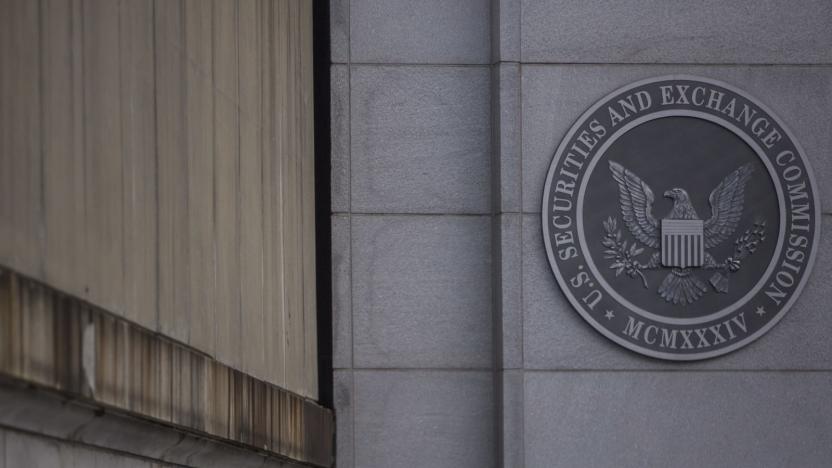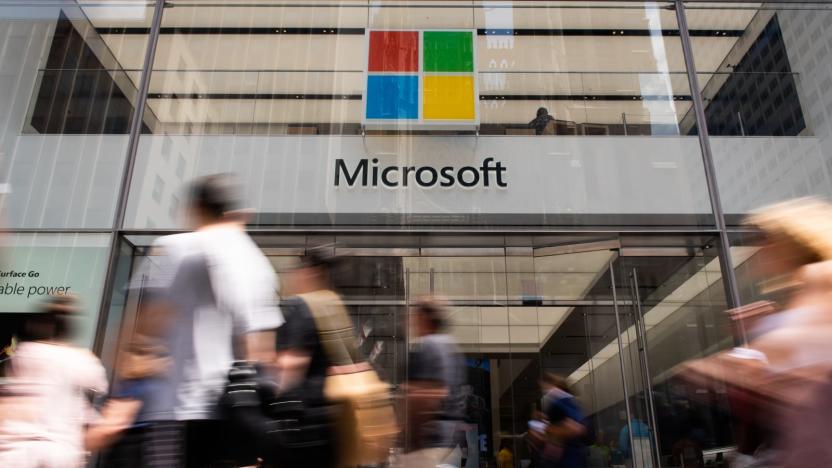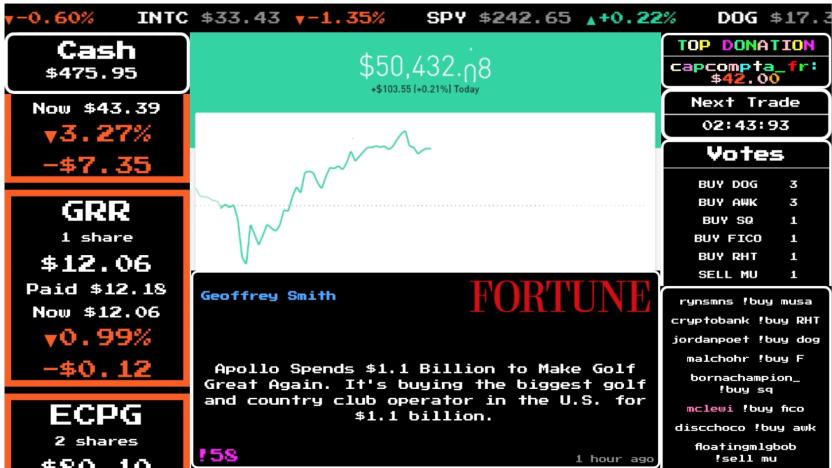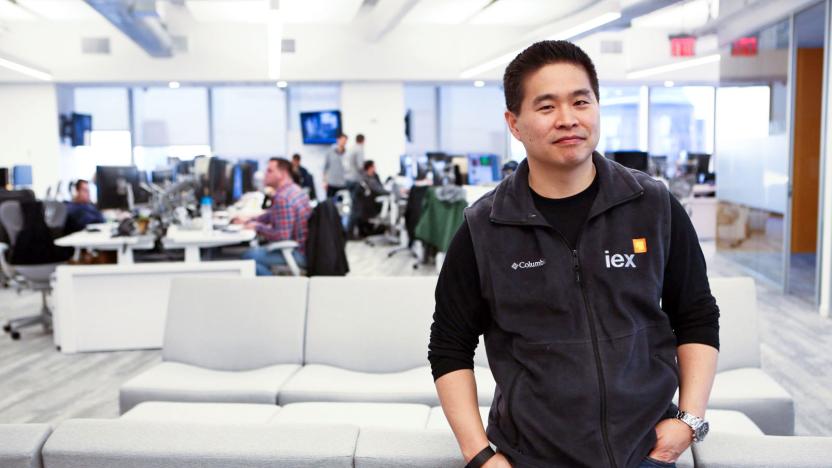stocks
Latest

SEC brings charges in connection with hack of its financial system
The United States Securities and Exchange Commission announced today that it is bringing charges against a Ukranian hacker for breaking into the agency's corporate filing system to access nonpublic information. The SEC is also charging a number of individual traders and entities who used that information to generate more than $4.1 million on illegal trades. The Attorney's Office for the District of New Jersey announced it will be bringing related criminal charges.

Microsoft briefly surpassed Apple as world's most valuable company
Apple's reign as the world's most valuable company might be in jeopardy. Microsoft briefly claimed the title on November 26th after its market cap surpassed Apple's, climbing to $812.93 billion versus its erstwhile rival's $812.60 billion. The lead didn't last long (Apple was back on top with $822 billion as we wrote this), but it's no mean feat when Microsoft hasn't had such a lead since 2010.

Cheddar is the new home of crowd-controlled StockStream
Watching other people play video games is a big business. At any time, you can hop on Twitch and see gamers take on Demon's Souls, Pokemon, and even Sudoku. It's not all video games, either, with Let's Robot and Instapainting exploring internet-controlled robots. Last May, software developer Mike Roberts created StockStream, a Twitch channel that encourages viewers to vote on which stocks to buy or sell using Roberts' own $50,000 stock portfolio. Now, Roberts and his trading game have been acquired by Cheddar, the "millennial business news" network that broadcasts from the New York Stock Exchange. StockStream will continue, though its balance will double and the portfolio extended to " commodities, industry portfolios, indexes, and other asset classes," according to a Cheddar blog post.

New stock exchange fights unfair online trading
Some (such as The Big Short author Michael Lewis) see high-frequency, algorithm-based stock trading as a serious threat to the economy. There's a concern that big trading firms are cornering the market by paying for ultra-fast connections that give them unfair advantages, such as front running (exploiting knowledge of advance orders from customers) and otherwise closing transactions before most rivals. Those financial heavyweights might not get to abuse the system if IEX has its way, though. It just opened a US stock exchange that aims to prevent these computer-driven attempts to game the system.

Nintendo loses billions in value after 'Pokemon Go' truth bomb
Pokemon Go is an unprecedented success, but Nintendo recently admitted it won't directly profit from the augmented reality game, leading to a loss of $6.7 billion in Nintendo's market value on Monday. Nintendo's market value rose by $7.5 billion on July 11th, just after Pokemon Go went public and became an instant, massive hit across the globe. Since its launch, Pokemon Go has added nearly $12 billion to Nintendo's market value, meaning today's dip, while sizable, isn't a total disaster for the company.

'Pokémon Go' helps Nintendo break major stock market record
Nintendo continues to make headlines, all thanks to Pokémon Go. Now the video game giant had the biggest daily turnover of any company on the Tokyo stock market this past Friday, July 15th.

'Pokémon Go' adds billions to Nintendo's market value
Pokémon Go is the latest hotness in mobile gaming and Nintendo is basking in its glow -- to the tune of $7.5 billion in additional market value. Nintendo stock closed up 25 percent on Monday, and by the end of last week, when Pokémon Go hit mobile devices across the US, Australia and New Zealand, the company's stock was already up 9 percent. Nintendo added $7.5 billion to its market value on Friday and Monday alone, Reuters reports.

The hostile takeover of 'Watch Dogs' studio Ubisoft continues
Ubisoft, the studio behind Assassin's Creed, Watch Dogs, South Park, Rabbids and plenty of other off-the-wall franchises, is slowly losing itself. The company is being swallowed up by Vivendi, the entertainment conglomerate responsible for Universal Music Group and Dailymotion, among other ventures. Vivendi has been buying Ubisoft stock with the goal of securing a seat on the studio's board, and it now controls 20.1 percent of Ubisoft shares and 17.76 percent of its voting rights. The latest stock purchase comes just days after E3 ended on June 16th.

Amazon's Echo speaker guides you through workouts
Amazon must want to help you fulfill your New Year's resolutions, since it just updated the Echo speaker with a handful of features meant to get your life in shape. To begin with, you can ask Alexa to start a 7-minute workout -- the voice-guided cylinder will coach you every step of the way. You can also get your investments on track thanks to a Fidelity feature that tells you how individual stocks are doing. And if you're more interested in how political leaders fare this year, you can ask the Echo when the next Democratic or Republican debate will take place. The additions won't change your life, but they're definitely cheaper than visiting the gym or a financial guru.[Image credit: AP Photo/Mark Lennihan]

Bitcoin tech approved as a way to issue shares
For the first time, the US Securities and Exchange Commission (SEC) is allowing a company to issue public shares using the technology behind Bitcoin. The honor went to Overstock, which was also the first retailer to accept Bitcoins from the public for purchases. It built its own crypto-currency tech via a subsidiary called T0 (T-Zero), and uses open-source Colored Coins to issue stock in the form of "blockchains," a type of electronic ledger. Overstock plans to license the tech to other public companies, and company CEO Patrick Byrne told Wired that it "can do for the capital market what the internet has done for consumers."

Trading stopped on New York Stock Exchange due to 'technical issue' (update)
It has been quite a day for tech problems. Trading on the New York Stock Exchange was halted due to a "technical issue" at around 11:30 AM ET this morning. On its status page, the NYSE posted that all trading had been suspended and any open orders would be cancelled -- with a more detailed explanation to follow. A NYSE spokesperson told Forbes that the stoppage came after the exchange "experienced a technical issue" that it's "working to resolve as quickly as possible." An hour before trading stopped, the NYSE reported a problem had been fixed concerning order acknowledgements and connectivity issues. NYSE Arca and NYSE Amex/Arca Options appear to be untouched by the larger issue as they are continuing to operate normally.

Scutify puts the bells and whistles on Wall Street
Scutify is a combination of many things, but it's mainly a social network built around the stock market. Monitor your important stocks and their current prices, get into trading and investing and chat about them with other members of Scutify. Post questions or status updates called "scuttles" to get the conversation going, which look like long, intelligent tweets. The app also integrates with Tradier Brokerage for investors to do what they do best and Twitter. Scutify is free for iPhone and iPad and requires iOS 7.0 or later. If you stare at Scutify for too long on your iPhone, your brain actually starts to hurt. Trending company logos at the top, a scrolling stock ticker underneath, investors' current opinions of the market, latest scuttles, plus a cluster of navigation options - it's a lot to take in. It feels like a software representation of all the chaos happening on CNBC during just about any program. The app is never void of content because right off the bat, Scutify appears to follow popular accounts at random. It feels weird at first but makes sense rather than just having a blank feed until you follow people. Above these latest scuttles from people are statistics about the market. Companies that are trending, an interactive stock ticker, and what's called the Scutify Sentiment giving a general consensus on whether stocks and the community surrounding them are bullish or bearish. If you tap a stock, the app brings up detailed information about its current price and pulls in relevant tweets and news articles. Use the search tool at the top to search for any stock in the United States, United Kingdom, Australia, Canada or India. You also get your own profile by tapping what appears to be a Dashboard icon at the top to view your own scuttles, track your follower account, see tweets relevant to the stocks you follow and more. To post a new scuttle, tap the New Post icon and type up to 500 characters with or without an image. The slide-in menu does absolutely nothing to consolidate an already disorderly app. Menu options here are Latest Scuttles, Premium Scuttles, Companies, Commodities, All-Star Users, Latest Articles, Trending 20 Index, Scutify's separate Sentiment app and that's not even the entire list. I'm drowning in everything Scutify is trying to pile into this app. To make matters worse, the navigation is just as confusing as it is cluttered. "My Dashboard," something that normally refers to a home screen is actually your profile while "Home" is for your Home screen. Also, Latest Scuttles displays a list of posts from other users, "My Scuttle List" is a list of stocks you're following. Are scuttles stocks or posts? The breadth of features Scutify offers investors and business enthusiasts in its app is extraordinary. In fact, I haven't even scratched the surface of what it's capable of. Unfortunately, I don't think anyone would ever be able to efficiently or effectively browse through the entirety of Scutify without yearning for some fresh outside air or a glass of wine by the time they close the app. Far too much is going on to the point that it's just plain difficult to use. At least on the iPad app, Scutify has more room to work with and does take great advantage of the larger display to showcase all of its features. Ultimately though if you're looking for a stock trading app, keep browsing until you find one that doesn't give you a headache.

Apple is probably worth more than your state (or country)
Today's big news on the Apple front is that the company topped a market capitalization of US$700 billion. That's a whole lot of cheddar -- or clams, bucks, greenbacks, simoleons, whatever you feel like calling them -- but when numbers get that big it's hard to understand what it means. To help put it into perspective, here's a list of things less valuable than the entirety of Apple's stock. The GSP (gross state product) of every U.S. state with the exception of California, Texas, New York, and Florida. The GDP of Switzerland, Sweden, Norway, Poland, Austria, and Belgium. In fact, if Apple were a country it would rank 20th out of 196 countries. The market cap of Microsoft, Sony, Samsung, LG, and HP, combined. 4 International Space Stations 280 Mars Science Laboratory rovers 1,270 U.S. Air Force long-range stealth bombers 1,060 Boeing 747-400 jet airliners 2,800 Hope Diamonds 2.3 billion pairs of Beats Studio headphones

Roku wants to grow its media hub empire with a public stock filing
Roku frequently comes across as the little media player company that could: its streaming box business is growing in spite of much larger competition. As healthy as it is, though, this upstart now appears eager to join the big leagues. Tipsters for both the Wall Street Journal and New York Times claim that Roku is planning to file an initial public stock offering (IPO) that could net as much as $150 million, roughly doubling what it raised through private investments. The details of just how and when this would happen are still murky, but the company said earlier this month that it's near turning a profit. It may wait until it's in the black and can put its best foot forward. If the IPO does happen, though, you should expect Roku to grow quickly. It's already striking deals with TV makers and has the support of major broadcasters -- the extra cash could both put more big-name services on your existing Roku box and improve the range of devices you can buy at the store.

Apple's stock buybacks spurred massive share price increase
With Apple making more money than it knows what to do with, the company in March of 2012 announced a capital return program consisting of stock buybacks and dividends. The initial program was designed to return $45 billion in value to shareholders, but as the money continued to roll in, Apple earlier this year upped the program to $130 billion. During Apple's most recent earnings report, Apple CFO Luca Maestri noted: "We have now taken action on over $74 billion of our $130 billion capital return program with six quarters remaining to its completion." With the majority of Apple's $130 billion capital return program centering on stock buybacks, Apple's share price has been on quite a roll as of late. And according to a recent report in Bloomberg, Apple's stock buybacks and its subsequent impact on the company's share price is unrivaled. The iPhone maker is up 25 percent since it spent $18 billion on its own shares between January and March and rallied 32 percent after a $16 billion buyback in 2013. Those are the highest four-month returns among the 20 biggest quarterly repurchases by any company since 1998, according to data compiled by Bloomberg and Standard & Poor's. While many factors go into a company's share price, sweeping stock buybacks certainly help to the extent that they significantly reduce the number of free floating shares and thus help pump up quarterly earnings per share (EPS). Highlighting the massive scale of Apple's capital return program, Apple during the March 2014 quarter alone spent more money on stock buybacks than Google generated in revenue during the same period. On a related note, last year we detailed how the extremely low interest rates Apple took advantage of to finance its capital return program helps the company save money in the long run. In short, the interest Apple owes, over time, turns out to be less than the dividends it would otherwise be on the hook for.

Three EA execs unload stocks as publisher hits five-year high
Two senior members of Electronic Arts sold off the entirety of their shares in the publisher late last week when the company hit the highest share price it's seen in well over five years. SEC filings revealed that Patrick Soderlund, executive vice president of EA Games and EA senior vice president and General Counsel Stephen Bene dumped their stocks after the company's shares traded at roughly $34.53 and $33.40, respectively. Soderlund unloaded 36,133 shares, while Bene sold 7,771. EA's shares opened at $35.31 today, the highest price per share the company has traded at since September 2008. Another high-ranking executive at EA disposed of stocks as well: Chief Operating Officer Peter Moore sold nearly half (100,000) of the shares he owned at $34.53 as well. This follows EA's fiscal 2014 earnings report last week, in which it revealed a 5.79 percent decrease in net revenue year over year ($3.58 billion). [Image: Electronic Arts]

Nintendo buys $1.1 billion of its own shares, Yamauchi family contributes
Nintendo has bought back 9.5 million shares of its own stock, valued at 114.2 billion yen ($1.1 billion), in its first step to stabilize the company's changing financial situation. The family of Hiroshi Yamauchi, Nintendo's late (and great) CEO, sold back a portion of its shares during this buyback, according to the acquisition document. We got wind of the Yamauchi family's involvement yesterday. Nintendo's year-on net profit fell by 30 percent in the final nine months of 2013, pulled down mainly by poor Wii U sales, the company reported. Net profit during this time was 10.2 billion yen ($99 million). Nintendo expects to post a net loss of 25 billion yen ($242 million) for its fiscal year ending in March. Nintendo CEO Satoru Iwata and his board members are taking temporary pay cuts, French news outlet AFP reported. Iwata will take half of his salary for five months, and board members will see cuts of 20 percent to 30 percent. Iwata took a similar pay cut in 2011, that time to offset poor 3DS sales. [Image: Nintendo]

Report: GAME preparing to rejoin stock market
2012 wasn't kind to retail chain Game - after closing more than 200 stores in the UK and Ireland, shuttering its Australian division, filing for administration (bankruptcy) and getting delisted from the stock exchange, its operations were purchased by sister investment companies. Luckily for GAME, it appears to have phoenix-like qualities - Sky News reports that the company is planning on rejoining the stock market. The effort will supposedly consist of a £300 million flotation later this year, which would involve selling shares of the company to the public. The move would suggest a strong performance from the retailer during both the holiday season and the launch of the Xbox One and PlayStation 4, with the former doubling the Xbox 360's UK debut and the latter moving 700,000 units in Europe and Australia by December.

Nintendo, Sony stock strengthens following suspension of Chinese console ban
After China opted to temporarily lift its ban on foreign-made video game consoles earlier this week, both Nintendo and Sony saw small bumps in their respective stock prices. As of this writing, Nintendo shares are trading at $18.66, whereas Sony is trading at $18.25. By comparison, Nintendo closed Monday at $17.01 and Sony closed at $17.30. Nintendo's shares lifted to 15,850 yen on the Tokyo Stock Exchange Wednesday, an 11 percent increase, then closed Thursday at 15,420 yen. Sony closed at 1,894 yen Thursday, up from Monday's 1,802 yen. Nintendo's increase is the highest since it traded at 16,430 yen in July 2011, at which point Nintendo dropped the price of the 3DS from $250 to $170, resulting in a stock plummet the company is still recovering from. To temper the excitement, both Nintendo and Sony's movements aren't enormous compared to its recent history. Additionally, both company's consoles were available in China as grey market imports, so the suspension of the console ban in the country just makes access to game systems that much easier. As Gamasutra points out though, should Sony or Nintendo begin manufacturing systems in the free trade zone, it must all be inspected by Chinese authorities before the consoles can be legally sold in the country, which might be enough time for the government to resume the console ban altogether.

Nintendo buys shares in company with mobile video content platform
Nintendo has purchased stock in Dwango Co., the parent company of Japanese mobile video content platform Nico Nico Douga, Business Week reported yesterday. Before you spread news of Nintendo finally venturing into smartphones however, know that Nintendo spokesperson Yasuhiro Minagawa has stated that the company is not planning to use the service to distribute games. Minagawa explained that the purchase was made at the request of Dwango's chairman, Nobuo Kawakami. Nintendo's stock prices rose by 5.15 percent after the purchase, the highest they've been since the month of August. The bump in stock prices follows Nintendo's call with investors last month, during which Nintendo stated that the Wii U "still has a negative impact" on their profits. During the same call, Nintendo reported an operating loss of 23.3 billion yen ($236 million) due to advertising initiatives and research and development for Wii U software.











